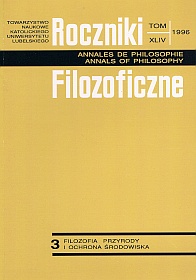Pojęcie obiektywności w filozofii nauki Karola R. Poppera
Abstrakt
The present article aims at distinguishing the main senses of the concept of objectivity in Popper's philosophy of science. Three senses are presented and discussed: objectivity as intersubjective control in science (§ 1); objectivity as some kind of existance − the so called world 3 exists objectively (§ 2); non-arbitrariness of scientific decisions, connected with the regulative idea of truth (§ 3).
The main aim of the present article is to show the most important contexts, where the problem of scientific objectivity arises (the article does not present the complete list of meanings of the term: "objectivity"). The discussed problem is of epistemological kind (in the classical meaning of this term).
The distinction between epistemological ("quaestio iuris") and historical problems ("quaestio facti") is assumed. (It is seems to be indispensable for a clear formulation of the problem of objectivity). Popper, who explicitly formulates this distinction, does not always respect it. There are some examples of naturalistic interpretation of strictly epistemological questions.
Copyright (c) 1996 Roczniki Filozoficzne

Utwór dostępny jest na licencji Creative Commons Uznanie autorstwa – Użycie niekomercyjne – Bez utworów zależnych 4.0 Międzynarodowe.





